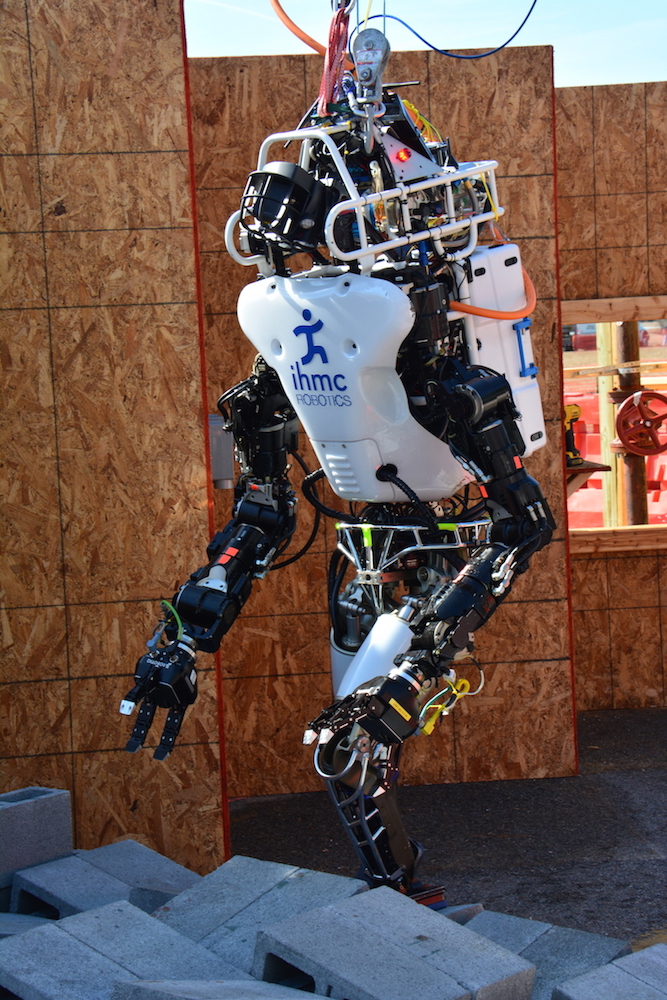Robot Showdown: Droids to Face Off in DARPA Robotics Challenge

Make way for robots!
This weekend, some of the world's most sophisticated robots will go head-to-head in a competition that tests their ability to assist humans in a natural or man-made disaster.
The DARPA Robotics Challenge Finals, funded by the U.S. military's R&D branch, will pit 25 teams against each other as their robots attempt to complete a series of physical challenges, all while navigating around disrupted communications between the bots and their human operators.
The competition, which is free and open to the public, will take place Friday and Saturday (June 5 and 6) at Fairplex in Pomona, California. The winning team will take home $2 million, while the runner-up and third-place teams will receive $1 million and $500,000, respectively. [See images of Robots in this Year's DARPA Challenge]
The challenge
The challenge, which began in 2012, was inspired by the Fukushima nuclear disaster in Japan in 2011, in which an earthquake and tsunami led to the buildup of explosive gas in the Fukushima Daiichi Nuclear Power Plant. The radioactive environment made it dangerous for human responders to take action, but robots could have investigated the stricken nuclear reactor in their stead, DARPA officials said.
"Disasters, both natural and man-made, are something we see every year happening throughout the world," Gill Pratt, program manager for the DARPA Robotics Challenge, said in a news conference in mid-May. "If we could only intervene [with robots], we could mitigate the extent of these disasters," he said.
Sign up for the Live Science daily newsletter now
Get the world’s most fascinating discoveries delivered straight to your inbox.
Teams from countries around the world, including Japan, China, Germany, Italy and the United States, will compete in the two-day challenge. In December 2013, 16 teams competed in the DARPA Robotics Challenge Trials in Florida, and 11 teams were selected to attend the finals. This March, another 14 teams qualified to take part in the finals.
The competitors include Carnegie Mellon University's CHIMP robot (short for CMU Highly Intelligent Mobile Platform), NASA/Jet Propulsion Laboratory's RoboSimian, Japan's Aero DRC robot and Germany's Momaro robot, to name just a few.
Later this week, the 25 finalist teams and their robots will attempt to complete one of four simulated disaster courses, featuring eight different tasks. Each robot will have one hour each day to complete the course.
The tasks
As part of the course, the robots will have to drive a vehicle to a simulated disaster zone, get out of the car and walk about 300 feet (10 meters) over a field of debris. At the disaster site, the bots must attempt to shut off a valve, connect some wires, cut a hole in a wall, climb a flight of stairs and exit a building. In addition, there will be a surprise task for which the teams won't be able to prepare, DARPA officials said.
The teams will be awarded points for each task their robot completes, and the team with the most total points at the end of the competition wins. If there's a tie, the team whose bot completed the most tasks in the shortest time will take home the top prize, DARPA officials said.
In a real disaster, communications are often poor or nonexistent. In order to mimic this scenario, the communications link between teams and their robots will be intentionally degraded during the competition, requiring the robots to be capable of completing basic tasks on their own.
Robot expo & workshop
During the competition, DARPA will also host a robotics expo, featuring interactive demonstrations from robotics organizations, first responders and unmanned systems manufacturers. The event will include demo technologies such as MIT's robot cheetah, which made headlines last week for its ability to detect and jump over obstacles in its path.
In addition to the robotics challenge, DARPA also held a student contest to create videos about the future implications of robotics for society, called Robots4Us. Five winning teams have been selected and will attend the challenge finals in California.
On Sunday, DARPA will host a private workshop, featuring presentations by the winning robot teams, DARPA officials, industry leaders and the winners of the student video contest. The robot teams will discuss how they achieved their success, and the other participants will discuss the role of robots in future society.
The robotics challenge will be live-streamed on the DARPA YouTube channel.
Follow Tanya Lewis on Twitter. Follow us @livescience, Facebook & Google+. Original article on Live Science.











